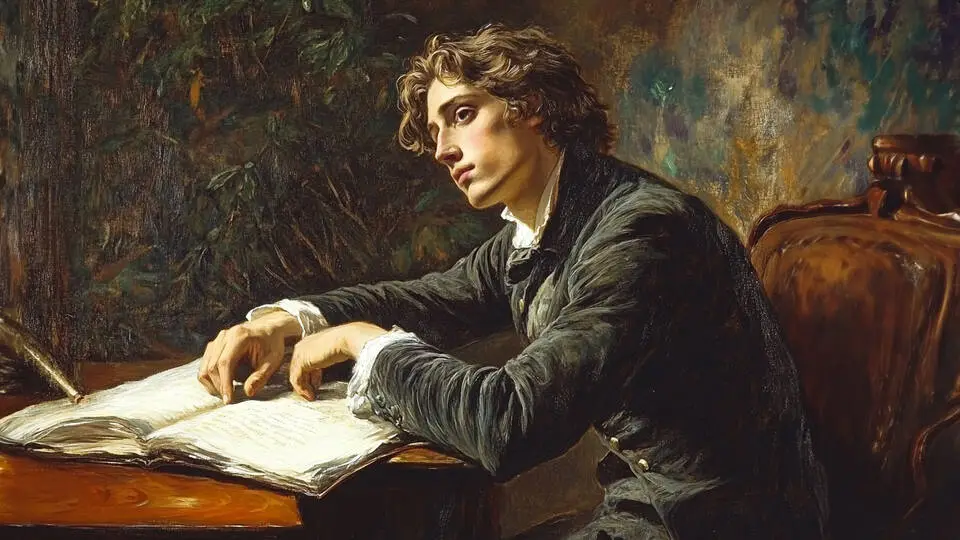“To Sleep” is an excellent Romantic-era poem, a sonnet written in 1819. It testifies to John Keats longing for the comfort and refuge of sleep. He was born in London, on October 31st, 1795, and tragically died young on the 23rd February 1831 in Rome due to tuberculosis. Most people know him for his sensory detail and emotional intensity in his verse. He was able, still to this day, to leave a mark on English literature.
“To Sleep,” on one hand, is an ability in the sonnet form. Actually, it merges fleshliness and philosophical introspection; sleep is both a refuge from cruelties in life and a near-spiritual escape.
Born in London, Keats lost both his parents at a young age and was apprenticed to a surgeon before deciding to pursue poetry. His early works, such as Endymion (1818), were met with harsh criticism, but he persevered.
His later poetry, including the famous odes written in 1819, such as Ode to a Nightingale, Ode on a Grecian Urn, and To Autumn, solidified his reputation. These poems showcase his mastery of language, philosophical depth, and ability to find beauty in fleeting moments.
Keats was deeply influenced by classical mythology, Shakespeare, and the works of fellow Romantic poets like Wordsworth and Coleridge. His poetry often explored the tension between imagination and reality, pleasure and pain, and life and death.
Tragically, Keats suffered from tuberculosis, the disease that had taken his mother and brother. In 1820, his declining health forced him to move to Italy in search of a milder climate, but he died in Rome at just 25.
Although he was underappreciated during his lifetime, Keats’ poetry gained recognition posthumously. Today, he is celebrated as a poet who captured the transient beauty of life with exquisite sensitivity, leaving behind a body of work that continues to inspire readers and writers worldwide. His epitaph, “Here lies One Whose Name was writ in Water,” reflects his humble view of his own legacy—one that time ultimately proved wrong.
His idea of the “negative capability”—the ability to accept uncertainty and mystery without the need for definite answers—became a cornerstone of his poetic philosophy.
To sleep a gentle force
“To Sleep” personifies sleep as a gentle, benevolent force. Keats begs the sleep to wrap him in such a way that his mind would avoid the pains of conscience, and escape all the day’s sharp pain which has not allowed him to sleep. Keats’s imagery herein-for instance, “poppy throws” and “hushed Casket of my Soul”-invokes rest and aligns sleep with themes of healing and release.
Yet beneath the unruffled surface of this poem lies an undertone of trepidation that speaks volumes about Keats’s personal battles with illness and death.
He gained more recognition after his death, which continued to inspire further successive generations of writers and artists well into the future. His influence went as far as the Pre-Raphaelite Brotherhood and beyond, sealing his reputation as one of the greats in English poetry.
“To Sleep” has been identified as a powerful consideration of the reprieve needed from the trials of life. It speaks to those souls who find solace in its timeless portrayal of rest as sanctuary.
To Sleep
“To Sleep” goes on to delight all readers and merits a place in many memorial services and public readings. Keats himself was enshrined in memory by yet another Romantic poet, Percy Bysshe Shelley, through his work entitled Adonais-a vindication for his genius and early death. Though he died young, his influence endures, inspiring poets and writers with his ability to find transcendence in fleeting moments of existence.
“To Sleep” by John Keats
O soft embalmer of the still midnight,
Shutting, with careful fingers and benign,
Our gloom-pleas'd eyes, embower'd from the light,
Enshaded in forgetfulness divine:
O soothest Sleep! if so it please thee, close
In midst of this thine hymn my willing eyes,
Or wait the "Amen," ere thy poppy throws
Around my bed its lulling charities.
Then save me, or the passed day will shine
Upon my pillow, breeding many woes,—
Save me from curious Conscience, that still lords
Its strength for darkness, burrowing like a mole;
Turn the key deftly in the oiled wards,
And seal the hushed Casket of my Soul.
For more poem inspiration visit the Save Funeral Costs blog of funeral poems.



